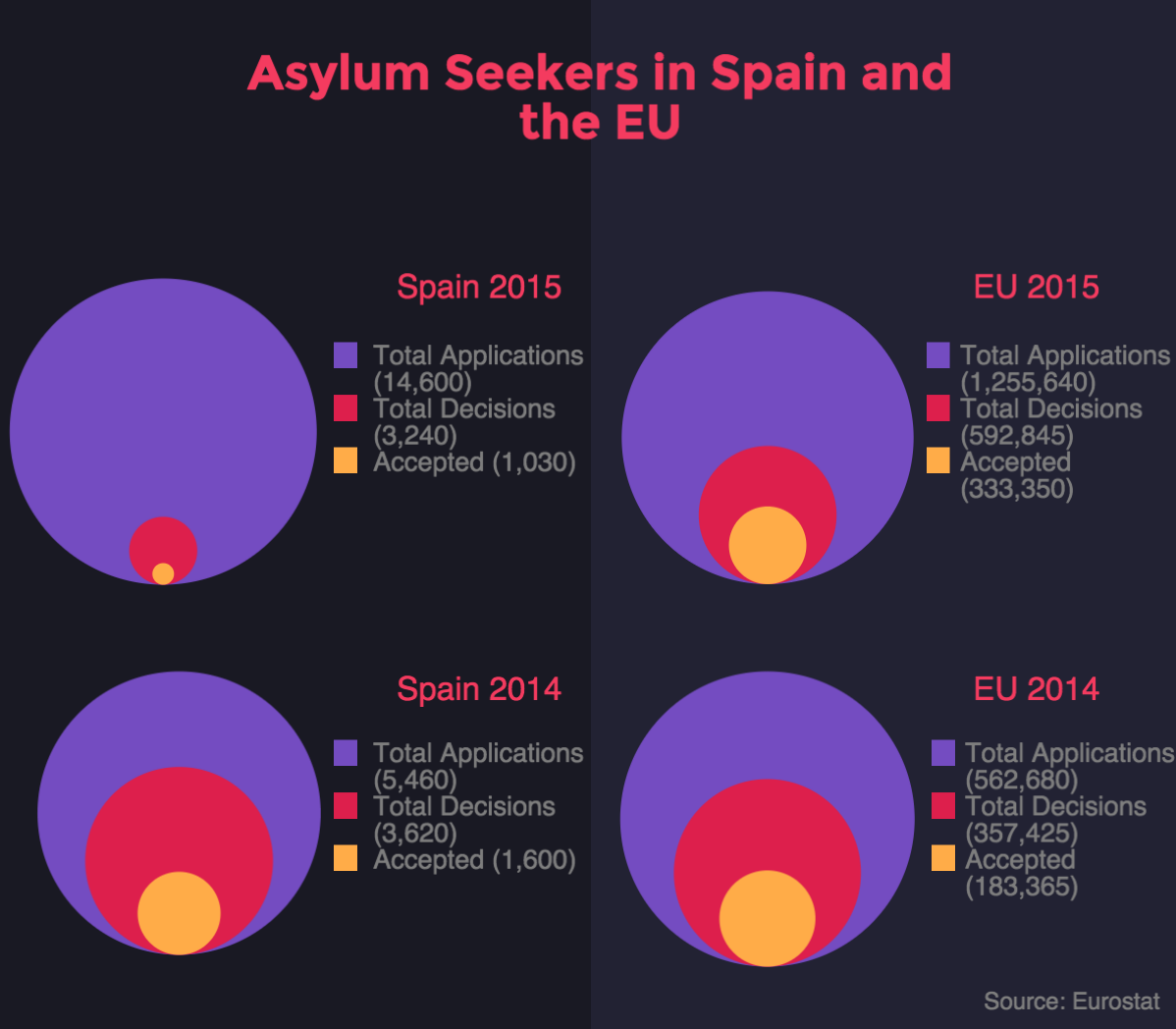By Joe Gladow
‘Spain: 18 refugees in six months,’ reported El País in early April. ‘Brussels rebukes Spain for failing to take in refugees,’ read a story seven days later. Such have been the headlines in the Spanish media over the past several months. In one sense, they accurately capture the lack of progress in resettling refugees in Europe. They do not, however, tell the whole story of the refugee situation in Spain.
Of the 16,000 refugees Spain pledged to accept last September, just 18 have arrived. This represents a miniscule 0.1 percent of its commitment. It shows the failure of the country’s leadership, as well as the EU, to adequately deal with the refugee crisis. This figure can be somewhat misleading, however, as it solely refers to refugees that the EU decided would be relocated from Greece and Italy as part of its resettlement plan. This plan, brokered by EU leaders in Brussels last September, mandated the redistribution of 160,000 refugees from frontline countries among EU member states. Spain’s assigned share of the group was 16,000. It was the expectation of the arrival of thousands of refugees to Spanish soil that led to the formation of Madrid For Refugees in August 2015 by a group of volunteers and inspired others, like me, to join the group. The 17 Eritreans and one Syrian that arrived in November and December were the first batch of many refugees that we expected would come in the following months in need of assistance.
However, while the resettlement of refugees has been painstakingly slow, it is not as if these 18 refugees are the only refugees living in Spain. Every year, Spain receives asylum petitions from people all over the world seeking protection from violence and political persecution in their home countries. In 2015, more than 14,000 people applied for asylum, nearly triple the number from 2014, according to the European statistics agency Eurostat. Of these applications, the government made decisions on 3,240 of them, granting 1,030 refugee status. In 2014, while the number of applications was much lower, the government made decisions on a similar number (3,620), granting refugee status to 1,600 applicants. The EU as a whole received more than 1.2 million applications in 2015, more than twice as many as in 2014. It accepted more than 330,000 refugees, an 80 percent increase from 2014.
In both 2014 and 2015, approximately two thirds of the accepted refugees in Spain were from Syria. However, significant numbers also came from Somalia, Pakistan and Palestine. A further 15 to 20 percent were from other countries.
Three NGOs have been charged by the Spanish government to manage refugees’ cases once they arrive: CEAR, Cruz Roja and ACCEM. They offer legal advice, organise accommodation and provide temporary financial support, among other services. In Madrid, refugees are housed in various state-funded refugee centres, NGO-operated centres and other normal apartment buildings throughout the city. In addition to these three principal organisations, there is also an extensive network of smaller NGOs and grassroots volunteer groups working to support refugees on a more individual basis. Among these are Refugiados Bienvenidos, the Asociación de Apoyo al Pueblo Sirio and our own group, Madrid For Refugees. Madrid For Refugees works closely with the refugee centre in Vallecas, organising classes and activities for residents, as well as providing support for individual refugees and their families. We also work collaboratively with other organisations, collecting donations and directing refugees to places they can receive help.
While the number of refugees living in Spain is not insignificant, it is still a drop in the ocean compared to the millions of people fleeing war in the Middle East, Africa and elsewhere. The asylum applications accepted by Spain represent just 0.3 percent of the more than 300,000 accepted by EU countries in 2015. Furthermore, the pace of the relocation of refugees from Greece and Italy has been agonisingly slow. In early March, the government promised to speed up the process, declaring it would accept 467 new refugees within the same month. However, reports by the European Commission two weeks later showed that not one of the announced refugees had arrived yet. While government officials blame the delays on slow EU processes and limited coordination between member states, many NGOs and associations, including our own, contend that the real problem is a lack of political will.
Whatever the cause, the fact remains that there are thousands of refugees both in Spain and elsewhere in the world that are in need of help. Independent of the politics of the crisis, individuals and organisations are making a difference at the local, national and international levels. With the support of many generous donors and hardworking volunteers, Madrid For Refugees continues to play an important role in this ever-growing support network dedicated to helping the refugee community.
About the author: Joe Gladow is a native of Seattle, USA working in Madrid as an English teacher. He was inspired to join Madrid For Refugees after watching news every day of thousands of people fleeing their homes in search of safety in Europe and elsewhere. He co-leads MFR’s NGO outreach team, working to build partnerships with other similar organisations in Spain and elsewhere in Europe.




